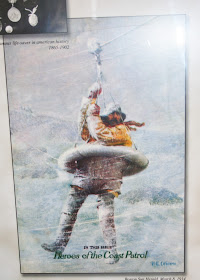 |
| View of Whitefish Point Light Tower and the Light House Keepers Quarters. |
 |
| It was a bit pricey at $13 per adult, but it supports the maintenance of the Whitefish Point Shipwreck Museum complex. |
 |
| A model of Whitefish Point Light Tower and Light-keepers Quarters. |
 |
| In the US Lifesaving Service Museum Building there is a replica of a 26 foot Beebe McClellan that was used during 1854 to 195 in the rescue of countless mariners in distress. |
 |
| In the back of the cart is the life ring/ breeches that was attached to the ropes to rescue those who were on the sinking ship. |
 |
| A canon ball with the rope attached, was shot out to the ship to create a lifeline. |
 |
| Once the rope was anchored to a high point on the ship, the breeches buoy was pulled to shore with those in peril. |
 |
| From the museum area there is a barrier free access to the shore of Lake Superior. Of course I had to pick up a Whitefish Point souvenir rock. |
 |
| We left the Shipwreck Museum and drove back 11 miles to the small town of Paradise, where Joe stopped at Brown's Fisheries. |
 |
| He bought some smoked salmon for $9 pound which was almost twice the price of what he has got it elsewhere in the UP. |











No comments:
Post a Comment